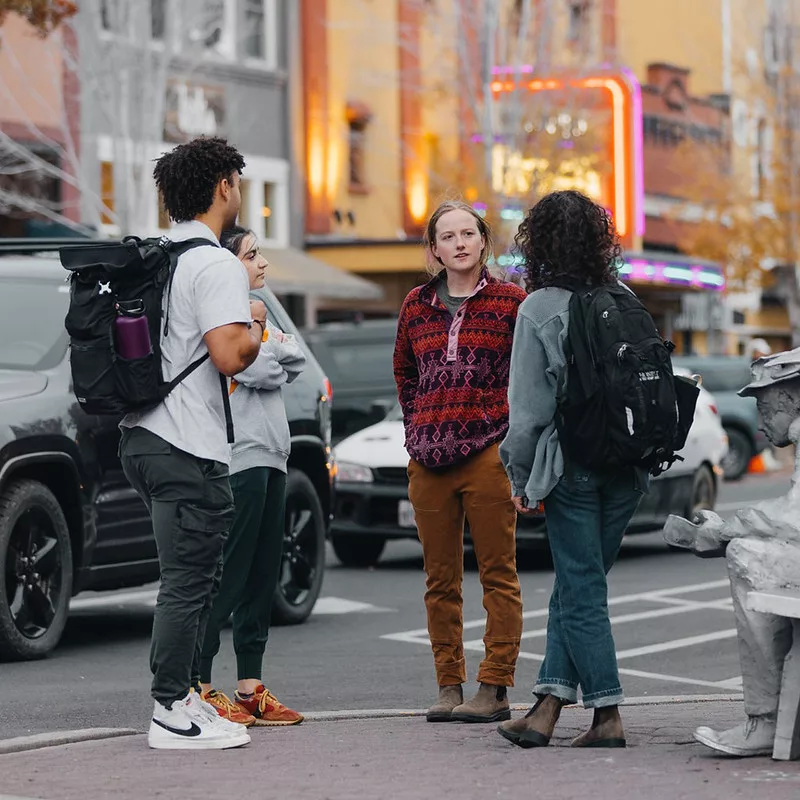A survey of more than 1,000 Central Oregonians found that community belonging is an important determinant of physical and mental health.
The survey, conducted by researchers at Oregon State University – Cascades and Oregon Health & Science University, also found that safety, relationships, and reciprocal, active participation are major drivers of belonging. Meanwhile, discrimination and economic and political divides were identified as barriers to community connectedness.
The research team released a report summarizing the results of the Community Belonging Measurement Project, which was conducted over the past two years.
The project was funded by the Central Oregon Health Council, following the council’s identification of belonging, resilience and community connection as key to human health and well-being in its 2020-24 regional health improvement plan. The United Way of Central Oregon also contributed funding.
It was led by OSU-Cascades’ and OSU College of Health human development and family sciences researchers Brianne Kothari, an associate professor, and Shannon Lipscomb, a professor; and Jackilen Shannon, a population scientist and professor in oncological sciences at OHSU’s School of Medicine. Camilla Dohlman of OHSU managed the project, and a team including undergraduate and graduate students contributed.
“The data collected showed that individuals who reported a greater sense of belonging also reported better physical and mental health. This relationship was consistent across all the groups we worked with,” said Shannon. “As a health scientist I found this to be an important finding as we consider policy and resources that support belonging.”
Interviews with community advisors informed the survey development and outreach approaches. Surveys and focus groups were conducted in Deschutes, Jefferson, Crook and North Klamath counties, and on the Confederated Tribes of Warm Springs Reservation. Community sessions helped interpret data and frame study findings within the experiences of community members. The project convened more than 25 local organizations that assisted in the data gathering.
“This study is unique because of its collaborative nature and focus on community,” said Kothari. “The findings also showcase the importance of cultivating connections and inclusive places and spaces for all. I am excited for our next steps here in Central Oregon.”
Some of the researchers’ additional findings include:
- Engagement in shared activities, volunteering and participation in community events contributes to a deeper sense of connection.
- Participants who identify as Black, Indigenous, or other people of color shared that culture is a strong source of belonging, and that discrimination and tokenism are significant barriers.
- Individuals who identify as LGBTQA+ shared experiences of discrimination and social exclusion, but highlighted support they experienced in community networks, advocacy groups and online forums.
- Physical and emotional safety creates a foundation for feeling secure, accepted and valued.
- Belonging is tied to specific places and spaces, such as workplaces, schools and public spaces like libraries and parks.
The report also included recommendations for individuals, community groups, employers and policymakers for reducing barriers to community belonging and resilience, such as:
- Empowering community members to engage in decision-making processes, with resources and training to enhance their capacity for positive change.
- Developing affordable housing with nearby, accessible transportation options to promote connectedness.
- Proactively building connections for workplace employees, going beyond work activities to foster community connections.
- Strengthening schools as community hubs and inclusive spaces for community events, cultural activities and educational opportunities.
- Prioritizing inclusive language to acknowledge individuals’ identities and experiences and foster a sense of belonging.
“We see this report as a starting point and remain committed to continuing to partner with the community to cultivate belonging, resilience and connectedness throughout Central Oregon,” said Lipscomb.
The study was also supported by the St. Charles Health System. In addition, Better Together and the Central Oregon Family Resource Center, Gender Hive, La Pine Activity Center and Restorative Justice & Equity Group supported the project’s community sessions.
About OSU-Cascades: Oregon State University’s campus in Bend brings higher education to Central Oregon, the fastest growing region in the state. Surrounded by mountains, forest and high desert, OSU-Cascades is a highly innovative campus of a top-tier land grant research university, offering small classes that accelerate faculty-student mentoring and experiential learning. Degree programs meet industry and economic needs in areas such as innovation and entrepreneurship, natural ecosystems, health and wellness, and arts and sciences, and prepare students for tomorrow’s challenges. OSU-Cascades is expanding to serve 3,000 to 5,000 students, building a 128-acre campus with net-zero goals.

